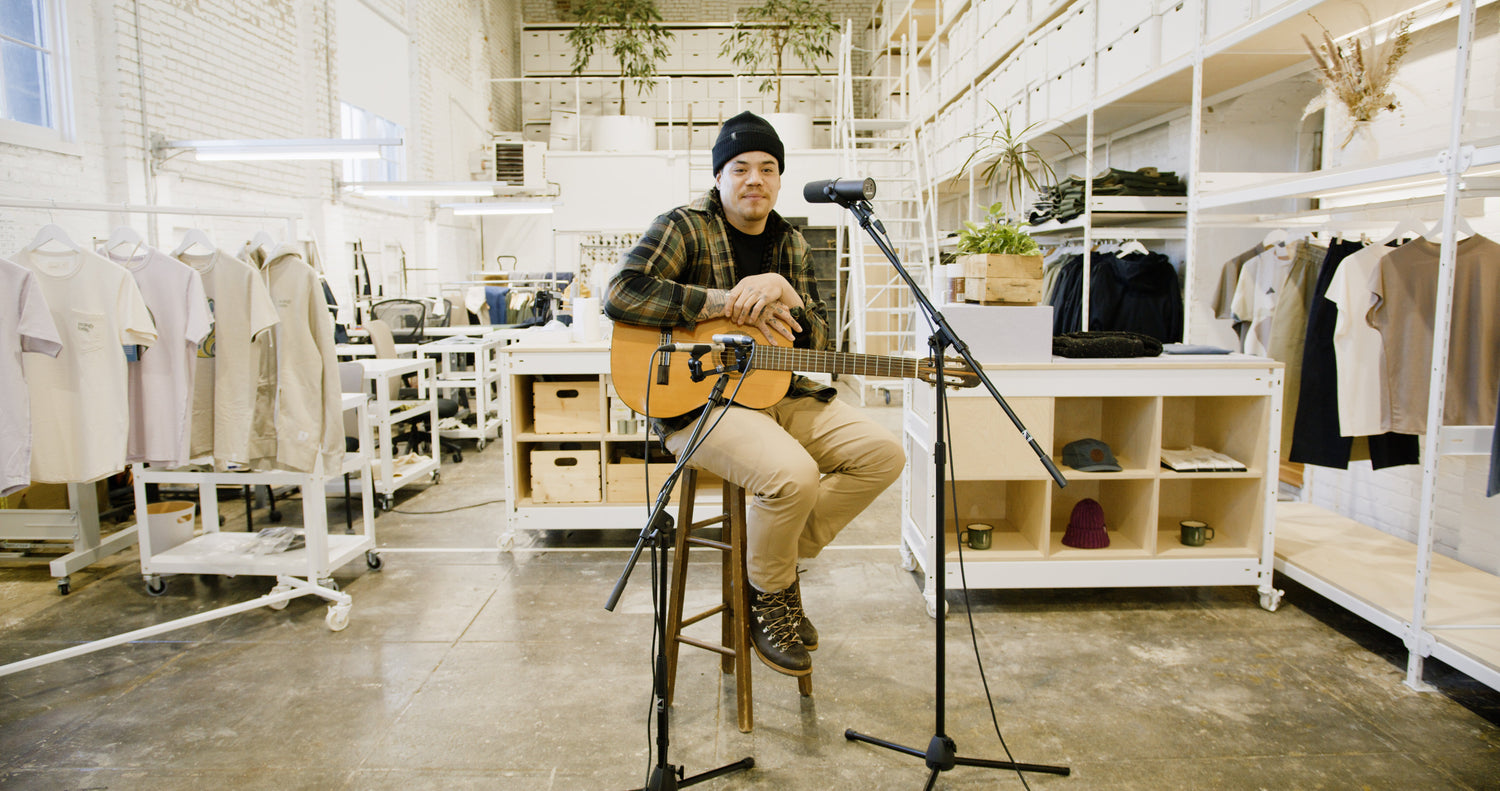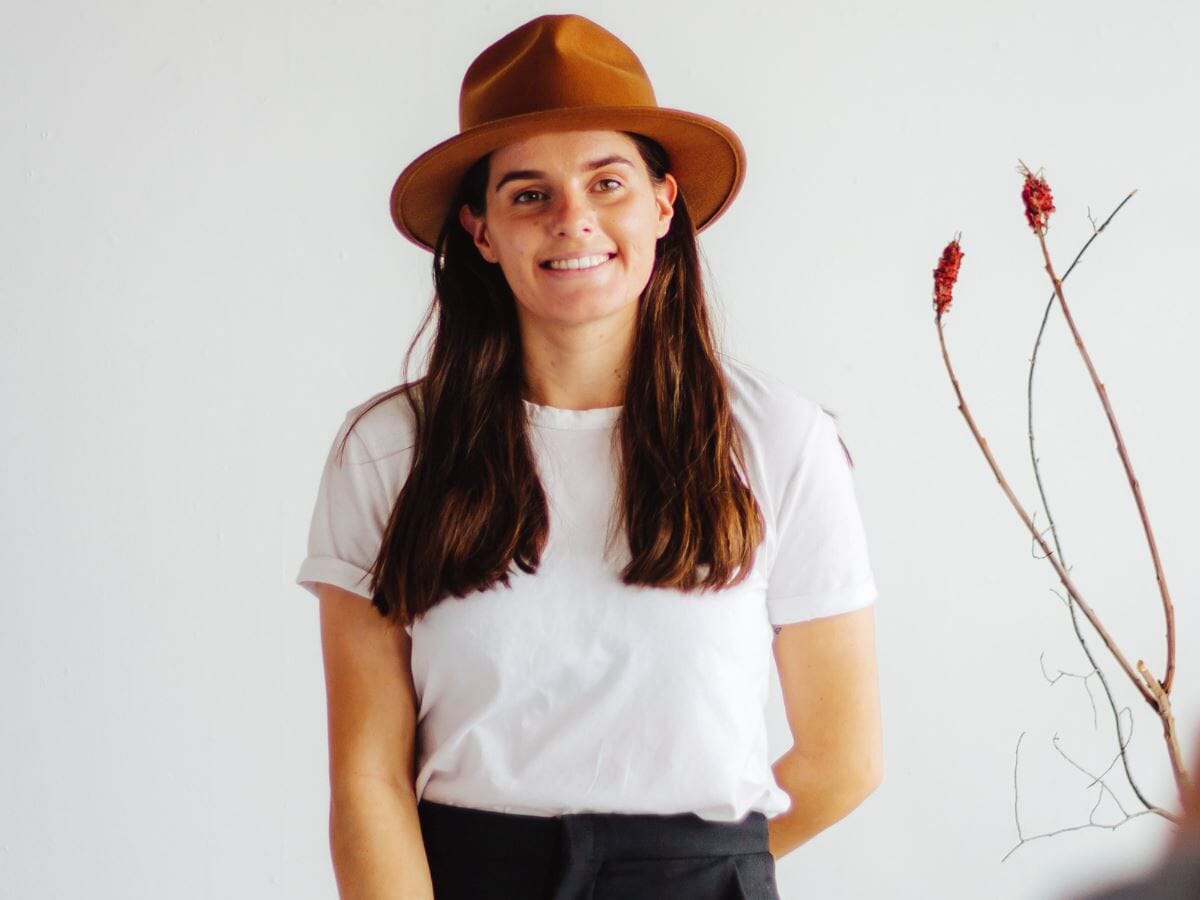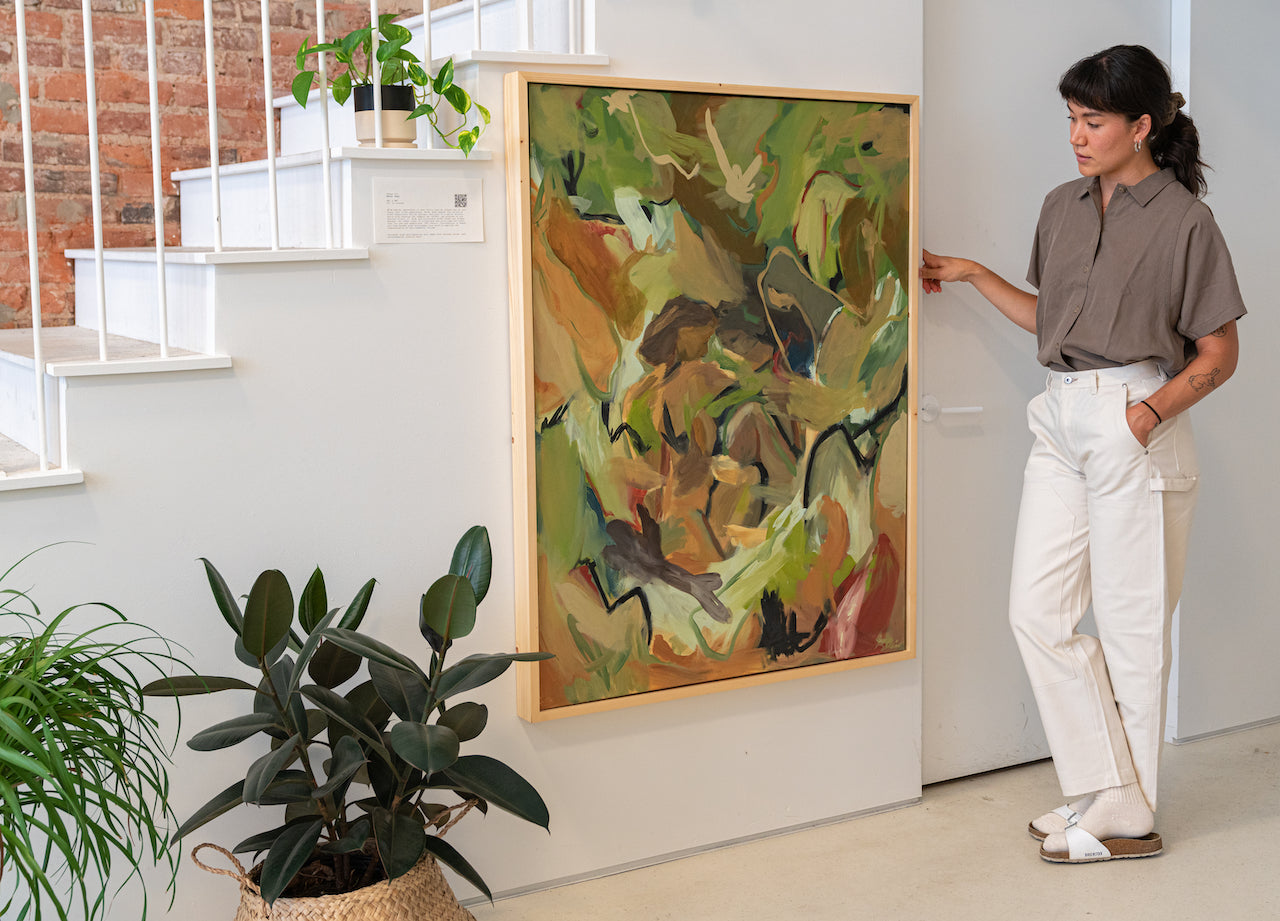Logan Staats is a Mohawk singer-songwriter from the Turtle Clan of the Six Nations of the Grand River. He achieved mainstream success throughout 2018 and 2019 after winning CTV's The Launch, a breakthrough that led him to play shows in Nashville and Los Angeles. His single, “The Lucky Ones,” won him the Indigenous Music Award for Best Radio Single. Logan is now touring the country for his “So-Called Canada” tour.
Alongside the re-launch of our ecologyst Live Sessions, we sat down with Logan to discuss his musical influences growing up, the importance of connecting back to Indigenous culture and the land, and what it’s like being the opening act for Indigenous music legend, Buffy Sainte-Marie.
ecologyst: We have a lot of people who would be curious to learn about your journey. Can you tell us a little bit about yourself?
Logan Staats: [in Mohawk, Logan’s native language] Shé:kon. Skennenkowa Ken?! Logan Staats Yonkyats. Anawara niwaki taro ten. Kanyen'kéha ka niwakonhwentsyò:ten.
It's custom to speak our language when we introduce ourselves. I'm a singer-songwriter and an activist, and a big part of both of those things is storytelling.
We've been telling stories for hundreds and thousands of years as Indigenous people. So sharing stories through music and folk songs has been a way that I've been able to do that, even as a displaced Indigenous person. I'm a generational survivor of residential schools, so I never had my culture growing up. I never knew any of my language. But inside of a song, inside of music, is the one place that I’ve known without a doubt that I am connected to the Creator. I just close my eyes and I feel it, you know? The catalyst for my whole reclamation journey was music.

e: Who was your biggest musical influence growing up? How did it evolve your music?
LS: I was so blessed to grow up in a house with good music playing. My dad always pushed the artists from my area, like Robbie Robertson of The Band. [Robbie’s] story is very similar to mine [growing up on Six Nations] and he was always playing in the house. The Band was always playing in the house, Bob Dylan was always playing in the house, Buffy Sainte-Marie was always playing in the house, so there were all these really great artists I was listening to. I think all of that stems from my dad and his taste of music, and just being a product of what was playing from my parents' stereo.
e: You actually mentioned earlier that you’re opening for Buffy Sainte-Marie later this year. Can you tell us a little bit about what that feels like for you?
LS: It's one of the craziest feelings of my life. I was 25 years old when I first got the call to open up for Buffy. I almost didn't believe my manager! The funny thing about Buffy is she handpicks the people who open for her. She's very good at giving up-and-coming artists a chance; part of her mission is to help Indigenous artists be heard. Now it's been 10 years of me opening four or five shows a year for Buffy. That woman is part of rock and roll history. I feel so blessed to get to play with her and even just talk to her, because every single word she says is so powerful. The Creator put me on this path to meet her. And that's another reason that I go into [Indigenous] communities and I do workshops, because I want to be able to do that for artists, too. Just like Buffy, who was so influential in my career. Now I'm in a position where I can go to places like Nunavut and meet a young musician and do the same, to pass that torch in the same way she did. She's just helped me in so many ways—musically, spiritually, and just helped me grow as a man.
e: Sounds like the most beautiful alignment of a true full circle moment. And now you’re currently on a tour aptly named “So-called Canada”. Would you be able to share the thoughts behind the name and what it means to you?
LS: Being an Indigenous person who's directly affected by the residential school system and the theft and desecration of our lands—and not just here, but back home at Six Nations, too—I've gotten to the point where I’m frustrated with this country and our leadership. Now I've made it my absolute goal and purpose to change the narrative of what's going on in this country, and help amplify these situations and help people realize that maybe Canada isn't this great place. It's got some secrets that need to be addressed and talked about. An open dialogue needs to be created. I'm using my music as a way to do that and a way to open up that dialogue and to start those conversations. And not only that, but hopefully [we can] collectively heal together and find some medicine in the music again.

e: Have you found that you’ve been able to change people’s perspective through your music?
LS: I think in the last couple years there's been a lot of social change that can’t be denied. People are waking up and seeing a lot of things that Indigenous people have been put through. It's at the forefront of the media right now, and with everything that's going on with residential schools and the unmarked graves, it's caused people to wake up and smell the coffee.
Being someone who's amplifying those stories, I bump into people all the time that have a wide range of emotions. A lot of people are really torn up about it, and there's a lot of shame on both sides. The system was designed to make us as Indigenous people ashamed of ourselves. But as all this stuff comes to light, you see a lot of Canadian people feeling shame too. It's a really weird time right now, but it's necessary. And it's like this kind of excruciating thing that we all need to address and talk about and move forward together.
e: You’ve spent time in Wet'suwet'en territory as well as Ada’itsx (Fairy Creek) and Landback Lane. How has this front line work shaped your outlook on Indigenous sovereignty?
LS: Circling back to residential schools, by having that displacement of my culture and not having my language or my teachings growing up, I was always searching for a way to fit in and to be comfortable in my own skin. When I’m out there on these front lines, pouring blood, sweat and tears into these movements, I know I’m connected with the Creator and that it’s where I’m supposed to be. [The frontlines] have been a place where I feel like I'm reclaiming my culture. I not only feel like I’m connecting with the land, but fighting for it.
It’s been both eye-opening and spirit-opening for me to be in these communities and see how our government can treat people—Indigenous protesters, white protesters, BIPOC protestors. It's been eye opening to experience that violence first hand. To know that it's out there and even as we do this interview right now, [the police are] moving closer to that river [on Wet’suwet’en territory]. They're chopping down our trees, they're taking our lands. It's a scary thing.

e: When in the throes of front line work and creating music, what keeps you motivated?
LS: The one thing that keeps me motivated is my children. I have a daughter, I have nieces and nephews that I raise. When I'm out there, I know what I'm doing is for the next generation. I know I'm fighting so my kid doesn't have to fight for her water, so my kid doesn't have to fight for her lands. The love that I have for the next generation is what keeps me motivated every day.
e: You previously said that fighting for the water is your way of giving back to the land, because water is what you felt so connected to as a kid. Can you elaborate on this?
LS: Water's been one of those ways that I've been able to be deeply rooted and connected to the land. Being out on the territory, like I said, we drink that water every day, our bodies are made up of water. When the water’s hurting, we’re hurting. When it's under threat, we feel personally under threat. Water is medicine. It helps me create, it helps me heal. It helps me live every day.
e: Some people may or may not be familiar with the term “land back”; could you explain what it means to you personally?
LS: For me personally, “land back” is an open invitation. It's an invitation for people to learn about these things that [Indigenous people are] going through, to jump on the front line beside us, and fight for these things alongside us. It's also not just about our lands. It's about our waters, our medicines, our language. I think the most important thing to note is it's not just an Indigenous thing — land back is an open invitation for everybody who wants to do what's right.
e: Where do you draw your inspiration from when writing your music?
LS: Music for me started as a way to get through heartbreak. I went through a couple of really rough relationships earlier in my life and music started as therapy for me to stop carrying it around. And then as I slowly grew into a young man, I saw other things that broke my heart more than a relationship—learning about residential schools and then about Wet’suwet’en and Fairy Creek—it's just heartbreaking, but in a different way. So music for me is a way to heal from that—it’s medicinal.
Lately everything that I've written has been about the river or about Fairy Creek, but that's only because it's where I've been for the last year of my life. I find I'll come home [from Fairy Creek] for a week and it just all falls outta me. I just can’t stop writing. Then I catch my breath and I get back out there. Everything derives from the experiences I'm going through; being arrested and all that stuff, it creates a lot of trauma. But then also being [on the frontlines] is healing. Seeing everybody working together cohesively and everybody fighting for something that's true and filled with love. There's always two sides to it. It's also been one of the most beautiful things that I've ever seen. To see nations from all across Turtle Island come together to fight for [the land]; there is something beautiful about these little tiny moments of resistance.
e: Do you find that storytelling is a way of both processing and healing?
LS: It's healing for me to sing about it and amplify the message. I almost feel like it's my responsibility as someone who has a platform to help tell the truth about what's going on, because it's so obscured and there are so many different narratives floating around. Before I was actually in Wet’suwet’en Territory and actually knew everybody and met all the hereditary chiefs, I myself didn't even know the full story. So I think it's [important] for me to sing about what I've been seeing with my eyes. It’s part of my journey and part of my responsibility as an Indigenous person.
e: If there was one main thing you hope people take away from your music, what would it be?
LS: My whole new album is called A Light in the Attic, and it's actually a play on words because a lot of the things that I've been been through for a long time—I struggled with addiction and different vices, [because of] social anxieties and depression and The Attic is about finding light in all of that. Finding your reason, finding your voice again, and finding that love for yourself again. So I think if you can take something away from my music, it's that everyone's got their gift from the Creator, whether it's singing or designing clothes or making TikToks—whatever your gift is, now's the time to direct that energy toward these fights that are happening. There's medicine in that, there's medicine in doing the right thing, so everybody should tap into their gift.
e: Could you elaborate more on the youth workshops you mentioned you’re facilitating, like the one you’re doing up in Nunavut.
LS: Anytime I visit a community, I always try to get into a community center or a school or something similar and just spend time with the next generation. Sometimes you go into these spaces and not all the kids are into it. A lot of kids are just there because they have to be there, but there's always three or four in each class that you can tell are really into music. They’re the guys and girls that I zero in on and try to help. It's one of those full circle moments for me. I wouldn't be here without mentors that did that for me. So if I can put myself in a space where I can mentor someone like that, that's the most rewarding thing for me. It’s to pass that medicine along.

Our Live Session with Logan can be accessed on YouTube here, where he sings his single "She Just Wants a Folk Song". You can also find him on Instagram, Twitter, and Facebook.
The ecologyst x Logan's Picks collection is available here.
Photos by Michelle Proctor.
*This interview has been edited for clarity and brevity.
![]()


